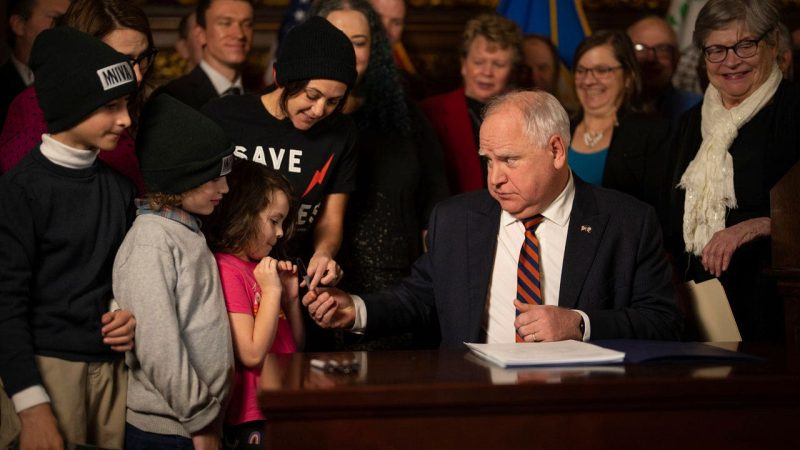
Minnesota Gov. Walz gives tax relief bill 1st signature of legislative session
Gov. Tim Walz signed his first bill of the 2023 session Thursday, legislation to simplify tax filing and save money for hundreds of thousands of Minnesota residents and businesses, including people with student loans and companies that received pandemic aid.
The bill brings Minnesota’s tax code into conformity with federal tax rules. It’s one of several that legislative leaders have fast-tracked since convening last week with Democrats now controlling both chambers of the Legislature. Bills on issues from abortion rights to unemployment benefits for laid-off miners are also expected to hit the governor’s desk soon.
The tax conformity bill sailed through both the House and Senate with unanimous bipartisan support. Officials said it needed to be signed into law by Friday so that tax forms and software could be updated in time for the filing season, which opens Jan. 23.
‘This is the way the Legislature’s supposed to work,’ Walz said at a signing ceremony.
It amounts to over a $100 million tax cut, and it’s retroactive, so individuals and businesses who qualify can file amended returns for previous years to claim refunds. Over 600,000 individuals and businesses will benefit, said Senate Taxes Committee Chair Ann Rest, of New Hope. The Department of Revenue has posted information on its website detailing who the changes affect.
The bill ensures that federal coronavirus, economic stimulus and other aid passed in recent years that’s exempt from federal taxation won’t be subject to state taxes. That means a retroactive state tax break for numerous businesses that got grants to keep them afloat while they were shut down during the height of the pandemic.
‘For the first time in almost three years, Minnesota’s small businesses, venues, movie theaters, restaurants — those of us that were the first to close and the last to reopen — can breathe a tiny sigh of relief,’ said Dayna Frank, president and CEO of First Avenue Productions, which owns the iconic First Avenue nightclub in Minneapolis.
It also ensures that forgiven student loans won’t be taxable by the state if President Joe Biden’s relief program survives a challenge that will reach the U.S. Supreme Court next month.
The Legislature had hoped to pass a similar package last year, but it got caught up in partisan stalemates that resulted in most of a $9.25 billion budget surplus going unspent. That projected surplus has since swelled to $17.6 billion, so there was plenty of money available for conformity.
Also moving quickly through both chambers is a bill to codify abortion rights, which passed its final House committee Thursday and could get a floor vote as soon as next week. It’s a top priority for Democrats, who hope Walz can sign it by the end of the month.
Abortion rights remained broadly protected in Minnesota even after the U.S. Supreme Court struck down Roe v. Wade. That’s due to a 1995 Minnesota Supreme Court decision. But the bill would write those protections into state statutes to prevent future courts from reversing them.
Similarly, a bill to remove several abortion restrictions from Minnesota statutes, which a state judge struck down as unconstitutional last summer, passed its first committee Thursday in the House.
One of the newest members of the Legislature, Democratic Sen. Grant Hauschild, of Hermantown, is the lead author of what could be one of the next bills to reach the governor. Hauschild narrowly carried his northeastern Minnesota district in November in one of a handful of races that tipped control of the Senate to the Democrats.
His bill, which passed the Senate 56-10 Thursday, would extend unemployment benefits for more than 400 laid-off workers at Northshore Mining. The operation has been idle since May 1. The main reason is a royalty dispute between its owner, Cleveland-Cliffs, and a trust that controls the mineral rights for the mine pit near Babbitt that supplies iron ore for Northshore’s processing plant in Silver Bay. Jobless benefits typically run out after six months in Minnesota, so the bill would extend them for another six months, retroactively, at a cost of $10.3 million.
That bill now goes to the House, where a first hearing is set for Wednesday. Democratic House Majority Leader Jamie Long, of Minneapolis, said he expects a floor vote ‘soon.’
